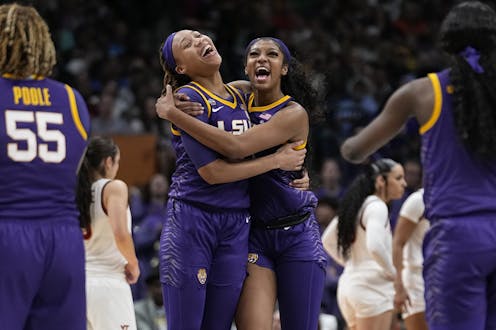How white privilege plays into the first lady’s idea to invite runner-up Iowa to the White House
- Written by Joseph N. Cooper, Endowed Chair of Sport Leadership and Administration, UMass Boston

After Louisiana State University beat the University of Iowa for the women’s college basketball championship on April 2, 2023 – winning by 17 points[1] – first lady Jill Biden floated the idea of inviting both the winning and losing teams to the White House to celebrate because Iowa “played such a good game[2].”
The idea drew a sharp rebuke from LSU star forward Angel Reese, who dismissed the idea as a “joke.”[3] Jill Biden then backed off the idea[4].
For insight on the social dynamics at play in the matter, The Conversation reached out to Joseph N. Cooper, a researcher at University of Massachusetts Boston who specializes on the nexus of sport, education, race and culture[5].
Why is race an important lens for this event?
As I argue in my book “From Exploitation Back to Empowerment[6],” race and racism are embedded in all aspects of U.S. institutions and social life. The fact that the majority of players on the national championship LSU Tigers[7] were Black women – and unapologetically outspoken and confident Black women at that[8] – compared to the majority white runners-up Iowa Hawkeyes[9], cannot be ignored.
Sports, as I have found in my research, often thrusts Black athletes into situations where they must confront societal inequalities[10] such as racism, sexism, economic stratification and other forms of oppression.
Being invited to the White House is traditionally reserved as a coveted reward for the team that wins the championship. The coincidence of first lady Biden inviting a majority white runner-up team signifies white privilege. I’m not aware of any situation where the team that lost a championship got invited to the White House, but it’s particularly difficult for me to imagine the same treatment being afforded to a majority Black team that was the runner-up.
I believe the racial dynamics at play reflect the double standard that is applied to Black people and white people in the U.S. In other words, Black people have the burden of doing more to get the same access and opportunity as their white counterparts.
Jill Biden’s faux pas comes on the heels of a different controversy that also involves LSU and Iowa – and that is the disparities in descriptions of the on-court antics of Iowa star Caitlin Clark, the 2023 Player of the Year[11], in comparison to LSU star Angel Reese, who was named Most Outstanding Player[12] of the 2023 NCAA tournament.
Caitlin was described by ESPN analyst Rebecca Lobo[13] as competitive, hardworking and a role model despite her engaging in multiple gestures that taunted her opponents and trash-talking her opponents. In one instance, she said “You’re down 15 points. Shut up.[14]” to an opponent, but she did not draw the same type of criticism.
On the other hand, when Reese engaged in taunting and celebratory gestures, she was described Barstool Sports founder Dave Portnoy as being classless[15].
When you look at these developments altogether, in my opinion, it sends a message that Black people are not held to the same standard as white people, even when they are part of a winning team.
As I note in my book “Anti-Racism in Sports Organizations,[16]” these recent events are a part of a long legacy of racism in U.S. sports. Examples from recent history include the late TV personality Don Imus making some racially derogatory on-air remarks[17] about the appearance of the Rutgers women’s basketball team in 2007. Or former Los Angeles Clippers owner Donald Sterling chastising his then-girlfriend in 2014 for “associating with Black people”[18] in public and on social media.
Are there other takeaways?
As the late comedian and social critic Dick Gregory once pointed out, many Black students have been socialized to believe they have to be “twice as good”[19] as a white person to get the same benefits and rewards. Jill Biden’s remarks did nothing to dispel this notion and may have even strengthened it.
W.E.B. DuBois prophetically said in the early 1900s how “the problem of the color-line[20]” would be a major problem for the United States for the 20th century. When you consider how race remains a problem well into the 21st century, it shows there is an ongoing need to identify and challenge racist beliefs and promote and embody anti-racist ways of doing, being and thinking.
References
- ^ winning by 17 points (theathletic.com)
- ^ played such a good game (apnews.com)
- ^ dismissed the idea as a “joke.” (www.cnn.com)
- ^ backed off the idea (www.wwltv.com)
- ^ nexus of sport, education, race and culture (scholar.google.com)
- ^ From Exploitation Back to Empowerment (www.peterlang.com)
- ^ national championship LSU Tigers (lsusports.net)
- ^ unapologetically outspoken and confident Black women at that (www.slamonline.com)
- ^ majority white runners-up Iowa Hawkeyes (hawkeyesports.com)
- ^ thrusts Black athletes into situations where they must confront societal inequalities (doi.org)
- ^ 2023 Player of the Year (www.cbssports.com)
- ^ Most Outstanding Player (www.nbcchicago.com)
- ^ described by ESPN analyst Rebecca Lobo (www.thegazette.com)
- ^ You’re down 15 points. Shut up. (www.cnn.com)
- ^ classless (nypost.com)
- ^ Anti-Racism in Sports Organizations, (static1.squarespace.com)
- ^ racially derogatory on-air remarks (newsone.com)
- ^ chastising his then-girlfriend in 2014 for “associating with Black people” (bleacherreport.com)
- ^ “twice as good” (www.azquotes.com)
- ^ the problem of the color-line (www.jstor.org)
Authors: Joseph N. Cooper, Endowed Chair of Sport Leadership and Administration, UMass Boston

